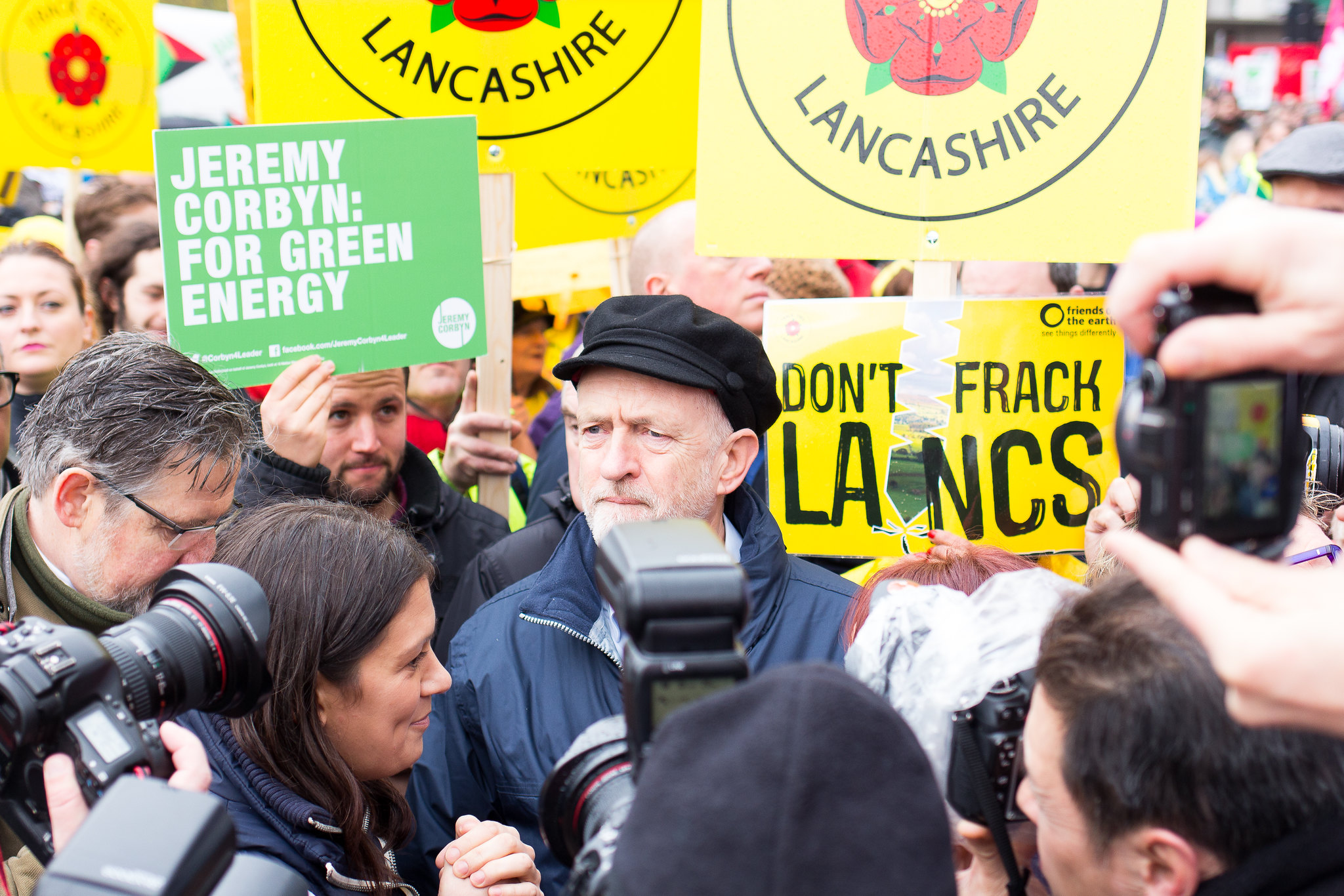
This year’s Labour party conference will be dominated by calls for transformative Green New Deal as Labour for a Green New Deal’s model motion was by far the most popular motion submitted by constituency Labour parties (CLPs) from across the country. The motion has commanded unanimous support in local parties otherwise divided along factional lines. Labour for a Green New Deal’s popularity vindicates our long-held belief that socialists are hungry for a married class and climate politics articulating a positive vision of the future.
Six months after the campaign’s launch in March 2019, this is just the beginning, and there are many more hurdles to clear before we can claim victory. At Labour conference itself, the motion must survive the compositing process which produced 2018’s Brexit compromise. In a meeting of delegates from CLPs, trade unions and the shadow cabinet, activists will defend the spirit of the motion against weaker versions and attempts to water it down. We know, though, that the will of Labour’s membership is for a radical target to decarbonise by 2030 through a socialist and internationalist transformation of the economy.
A conference vote in favour of a Green New Deal would not guarantee its ascension to party policy either. It would be sent into the democratic black hole of the National Policy Forum (NPF) and then only considered at the Clause V meeting. Attended by the national executive committee (NEC), shadow cabinet and union officials, it is this meeting which decides Labour’s manifesto immediately before a general election. Labour for a Green New Deal and our supporters will continue campaigning for the motion which passes through conference to become Labour’s headline policy in an election.
The experience of organising towards Labour conference this year has underlined the gaping holes in the party’s democracy. There is no clear route for a motion to go from an individual member proposing at branch level to the national manifesto even if it wins the vote every step of the way.
Democratisation was one of the promises of Jeremy Corbyn’s 2015 leadership campaign. In his inaugural party conference speech as leader, he said: “One firm commitment I make to people who join our Labour party is that you have a real say, the final say in deciding on the policies of our party.” Persistent sabotage from the Labour right and external forces has undermined that democratic ambition, forcing the leadership to close ranks. We have not seen the replacement of the NPF with an NEC policy commission, nor an enhanced policy role for the annual conference as the sovereign body of the party, or the introduction of open selections for parliamentary candidates.
Labour for a Green New Deal has given many ordinary Labour members the motivation to stay and fight in the face of climate breakdown, Brexit malaise and unrelenting attacks by the right. If the motion is blocked or seriously watered down at any stage we risk alienating members from the party and the movement. To win the imminent general election, Labour must inspire thousands of members to campaign. To do that, members must feel a genuine stake in shaping the direction of Labour’s transformative project. Especially as runaway climate change looms.
Democratising the Labour party was never going to be easy. Four years into Corbyn’s leadership, grassroots campaigns like Labour for a Green New Deal, Labour 4 Day Week, Labour Against Racism and Fascism, and Abolish Eton are taking the struggle for party democracy into their own hands. These campaigns have given Corbynism new life. By agitating for policy to align with members’ radical ambitions, together they are creating the political conditions for the party to move forward by necessity.
It was termed Corbynism 2.0 in May 2019 when Momentum backed a suite of radical new policy proposals emanating from these campaigns and associated think-tanks. Labour for a Green New Deal has been the most successful of those initiatives with 128 motions submitted to conference by CLPs. Why? The campaign has been unique among these initiatives due to our distributed organising model.
With over 20 established local groups, and over 25 more in process of being formed, Labour for a Green New Deal has built organising capacity across the country. Inspired by ‘big organising’ principles, the national organising team has activated dozens of new activists by openly recruiting co-directors, team leads and organisers on the basis of skill, enthusiasm and dedication. Other grassroots initiatives should follow suit to strengthen their hand.
Organisation-building within and around the Labour party is a crucial antidote to lingering undemocratic structures. Labour for a Green New Deal is already part of the growing ecology of movement infrastructure. New institutions of the left build resilience by creating the space for ambitious thinking and autonomous campaigning outside of the party’s constraints.
Whatever happens at this year’s conference, Labour for a Green New Deal will pour energy into growing our grassroots base which is already innovating climate organising. Sheffield Labour for a Green New Deal have hosted ‘Taking on the climate crisis on the doorstep’ in marginal constituency Sheffield Hallam. Greater Manchester Labour for a Green New Deal are organising regular ‘climate questionnaires’ with local residents.
The grassroots of this movement will go further still and organise deeply in communities and workplaces to co-develop the best ideas to substantiate the campaign’s demands. The Green New Deal is a national programme but it will be won or lost in its relevance to local areas. By building alliances with workers through their unions, we will provide a platform to reimagine how their skills can be used to kickstart new services and industries. Led by the labour movement, a Green New Deal will mobilise every single part of the economy towards decarbonisation and delivering prosperity for the many. When it comes to climate breakdown, it couldn’t be clearer that the cause of labour is the hope of the world
Chris Saltmarsh is a co-founder of Labour for a Green New Deal.